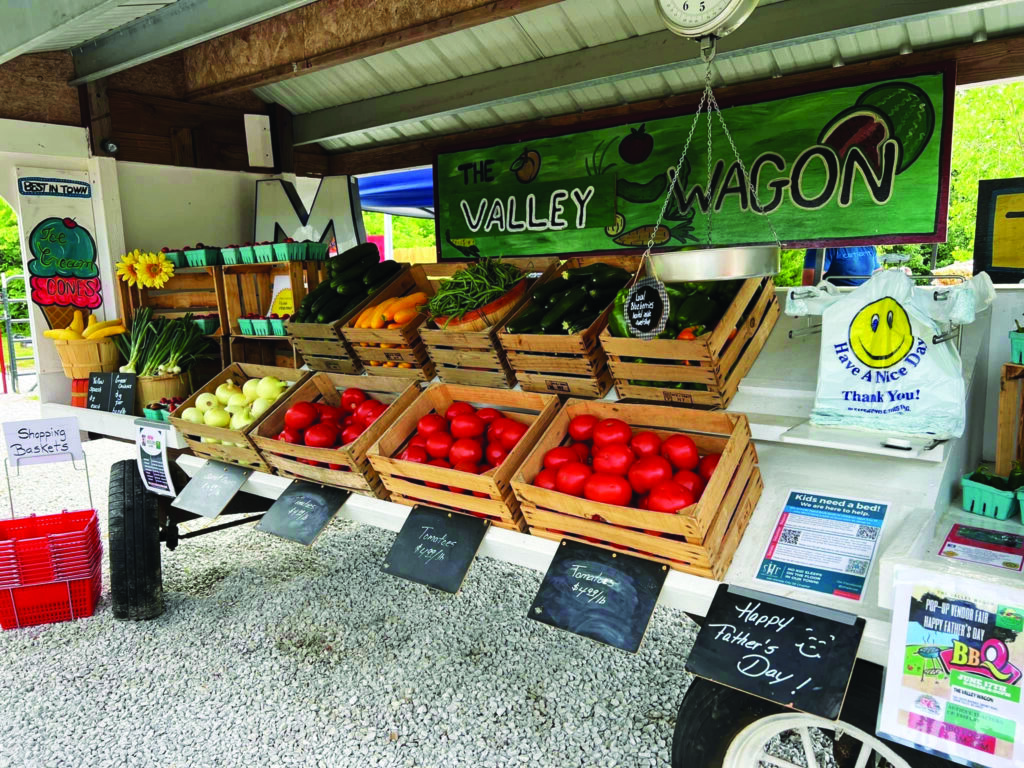Missouri Life’s inaugural year was 1973. We wrote an article on roadside stands back then and we revisited them again in the September 2023 issue. Roadside stands are seeing a comeback. Find out where these stands are and visit one near you.

By Glory Fagan
A FRESH TAKE
Roadside stands enjoy a revival, thanks to bold young entrepreneurs.
Fifty years ago, during its inaugural year, Missouri Life featured an article on roadside stands. Even in 1973, roadside stands were nothing new. Generations of hucksters, as they were called, had long hawked their wares from makeshift markets along pedestrian thoroughfares, city streets, and gravel roads. These stalls sold fruits and vegetables—perishable produce brought directly from field to market by individuals and families just trying to make a living.

Photo courtesy of The Valley Wagon
My grandfather, Paul Christensen, was one such pavement merchant.

Photo by Glory Fagan
Along with my grandmother, Maxine, and their children, and like his father before him, Grandpa peddled apples and tomatoes and his signature horseradish from stalls along the north end streets of St. Joseph. One early 20th-century census even listed my grandfathers’ occupation as “hucksters,” which derives from a Middle English word meaning “haggle.” My dad refers to times during which a family photo was taken in front of their makeshift market as “our Grapes of Wrath days.”
Following the Depression, when economic prospects improved, Grandpa moved his produce venture, by this time called Payless Fruit Market, to a cement block building on St. Joseph Avenue. I spent nearly every Sunday of my early childhood amid the pungent scents of potatoes, watermelon, and root vegetables. By the time Missouri Life was founded in 1973, and at the height of the Blue Laws in Missouri that restricted Sunday liquor sales, Grandpa had expanded the market’s offerings to include a cooler filled with 3.2 beer.
Fifty years later, the roadside stand model is seeing a resurgence as families opt to eschew the brick-and-mortar model for a more flexible operation that fits their lifestyle. Some are still true roadside stands. Others can’t be found on any map but do business on the internet. Still others hearken back to the lemonade stands of our youth, as enterprising entrepreneurs in their teens and younger raise, market, and sell wares produced by their own toil. These are their stories.
121 FARMHOUSE KITCHEN

Photo Courtesy of 121 Farmhouse Kitchen
North of Warrensburg, in a scenic, out-of-the-way spot, is the Missouri Century Farm where 121 Farmhouse Kitchen has evolved from a sweet side hustle to a booming roadside business in less than a decade. Here, a sign featuring a stacked cow, pig, and chicken logo marks an enterprise started in 2013 after owner Ashland Bell lost her job. She began baking at home and selling at farmers markets to pay the bills while she looked for another career opportunity. Ashland returned to the workforce but began selling shippable bakery items from an online Etsy store

When the pandemic struck, Ashland’s Etsy store exploded with orders from all 50 states for homemade fresh bread and cookies. Ashland placed a deck box outside her home for local customers to pick up special orders, check for extra bakery goods, and pay electronically or by placing cash in the drop box. By the time summer was in full swing, Ashland realized the box system was inadequate for Missouri’s hot summer days. The concept of no-contact delivery was working well, so she purchased a used 10-by-12-foot garden shed and pulled in favors from family and friends to retrofit it as a tiny, temperature-controlled, self-service station called the 121 Farmhouse Kitchen Market.
In July 2020, the self-serve honor market opened its doors with a vendor event grand opening and blew everyone away with a new twist on an old concept. Open seven days a week, 121 Kitchen Farmhouse began offering baked goods, fresh-grown produce, eggs, cheese, honey, and a few local gift items. Ashland had planned to keep her full-time job for two years until the store could grow and sustain itself. After only two weeks, Ashland left her job to bake full time and keep pace with demand. During most weekends in 2020, cars lined the driveway waiting to get in, since only one family could shop at a time.
Customers would shop, fill out an envelope with the items they purchased, pay with cash, Venmo, or PayPal, and leave the envelope in the drop box. The customer base came from miles around to shop the little market. Ashland depended on social media to keep customers up-to-date on what was available in the store daily, sometimes hourly. When she would announce the market drop of Farmhouse Chocolate Chip Cookies, there was a race to see who could get to the market first.
By January 2021, baking had taken over Ashland’s entire house with supplies, cooling racks, and packag- ing stations. Success was taking a toll on the family who were by now basically living in a working bakery. It was time to expand. The Bells ordered a new 16-by-40-foot building to provide retail space and a commercial kitchen and placed it on the south side of the family home. While still running the bustling market, Ashland again relied on friends and family to fashion the inside of the new market space. Long days of love, sweat, and tears, the rising cost of building materials, and pandemic-related supply chain issues presented challenges for the undertaking but resulted in a dream-come-true for Ashland.
By that fall, the Bells were in their new facility and expanded their product line to include local milk, fresh meats, ice cream, gifts items, and household wares from more than 20 local consignors. The fully inspected commercial kitchen, opened in October 2021, permitted Ashland’s family to have their farmhouse back. “I felt as though I could escape to home each night instead of living at work,” she says.
Featuring an array of ever-changing, locally sourced offerings based on the seasons, 121 Farmhouse is known for its ice cream and fresh salsa made in-house. Missouri produce, plants, meats, cheeses, candies, snacks, soap, candles, pet items, unique wares, and locally crafted items line the shelves. The full-service bakery offers custom-order cakes, rolls, cupcakes, pies, breads, muffins, and frozen, ready-to-bake cookies and confections.

Since its inception as a little side gig to make ends meet, this widely known Johnson County treasure remains a self-service honor market open seven days a week, 365 days a year, Monday to Saturday from 8 AM to 8 PM, and on Sunday from 9 AM to 7 PM.
1047 NE 121st Road, Warrensburg,
121FarmhouseKitchen.com
THE BOYS FROM CHAMOIS

Photo Courtesy of The Boys from Chamois
Known by their motto, “Small Town. Big Farm. Bigger Plans,” The Boys from Chamois is a vegetable farm in northern Osage County in the Missouri River bottoms. “The Boys” refers to Ben, Alex, and Eli Paulsmeyer.
“The family has been farming this ground since the late 1800s,” says Ben, the marketing-minded brother of the trio. He added, “We began by selling watermelons on the roadside stand and expanded from there.”

The roadside stand they call The Wagon is run by the honor system with a lock box for payments. The Paulsmeyers specialize in sweet corn, watermelons, cantaloupes, and pumpkins. “We have an assortment of other seasonal veggies including tomatoes, zucchini, yellow squash, cucumbers, peppers, and ornamental gourds for the fall—all grown on our farm by us,” Ben says. “We have been selling produce on the roadside stand for more than 20 years. We also sell wholesale produce to eight to 10 local grocery stores.”
Ben, Alex, and Eli each work on the vegetable farm. Ben and Alex are also full-time farmers on the family’s row crop operation, and Eli is currently enrolled at Mizzou. It takes a big team to harvest the vegetables, so several local high school boys help during the busiest seasons.
The wagon is at the intersection of Rainy Days Trail and Highway 100, four miles east of Chamois, which is pronounced like it’s spelled—without any French inflection and rhyming with “boys.” The reason the
Paulsmeyers opted for this form of commerce is simple: “It’s very cost effective,” Ben says. “We don’t have to spend our time sitting in one spot. We can use our time for harvest or for other farm duties.”

In addition to their roadside stand, the brothers participate in the Cole County Farmers’ Market and Columbia Farmers’ Market. Ben says those markets accept credi and debit cards via a Square reader. “At the unmanned roadside stand, it is just cash or check. And the occasional ‘I owe U’ on a piece of scrap paper from a regular customer without the right change.”
But the old-fashioned business model doesn’t mean the boys ignore modern marketing strategies. “Social media has been a big boost to our business,” Ben says. “As soon as I put it on Facebook that the first sweet corn or melons are on the wagon, there will be a line of cars stopping by within the hour.”
Recognizable by their signature green shirts and green tent at the local farmers’ markets, The Boys from Chamois appreciate repeat customers who keep coming back and bringing their friends. “Lots of time, one person will come but will be picking up for several people,” Ben says. “We put a lot of effort into only selling the best quality stuff and try very hard not to sell anything that doesn’t meet our standards, even if it means letting some produce go to waste. You can’t put a bad taste in a customer’s mouth and expect them to keep coming back. I think people enjoy doing business at the farm and like knowing where the fruits and vegetables come from.”
Rainy Days Trail & Highway 100, Chamois,
BoysFromChamois.com
RUDY LANE FLOWER FARM

Photo Courtesy of Megan Rudoff
The farm stand was always the goal of Rudy Lane Flower Farm. As both Layne and Megan Rudoff have off-farm jobs, the Linn couple needed a way to offer their flowers that wouldn’t take them away from other responsibilities.
Rudy Lane Flower Farm officially started business in 2020, after the Rudoffs planted more than 250 peony roots in the autumn of 2019. Since then, they have expanded to over 600 peonies, 700 dahlias, and dozens and dozens of annual plants. Rudy Lane flowers are available via the farm stand, and the business also offers a monthly bouquet subscription program. Rudy Lane hosts flower-related workshops throughout the year, too.
The farm stand operates by the honor system; customers pay with cash, check, or Venmo. Rudy Lane keeps pricing simple by including sales tax in the purchase price. The business offers online sales for some products; customers can opt for local delivery or farm stand pickup. As the farm stand does not offer shipping, Rudy Lane encourages those who live at a distance “to find the flower farmer near you!”
Rudy Lane Flower Farm is 100-percent a family affair. Layne and Megan, along with their three young daughters, work the business as a family. “I do most of the planning, growing, and harvesting,” Megan says. “Layne does the tractor work, support netting, irrigation, and delivery. The girls help out with transplanting and dead-heading. I’ve found that the tiny fingers of a two-year old are perfect for extracting seedlings from cell trays!”

Photo Courtesy of Megan Rudoff
Their offerings are entirely homegrown and seasonal. Fresh-cut bouquets and arrangements are available during the spring and summer. They add pumpkins and other fall-themed items in September, and then evergreen wreaths as the holidays approach.
According to Megan, “One of the benefits to our farm stand is that people can make the visit part of their selfcare. I have a lot of ladies who like to grab a latte from the coffee shop, turn on their favorite podcast, and make the country mile drive to the farm stand on a Saturday morning. Other times, they will bring their kids out and let them pick whichever bouquet they like the best.
“I think what people love about our business is that we are not trying to be ‘big city.’ We are a small family business—a farm business at that—in the community my husband’s family has been in for 150 years. We are bringing a unique opportunity for members of our county to enjoy without having to drive 30-plus minutes to the big city. People appreciate that sense of community and feel a sense of pride about it. Oh, and the pretty flowers help, too!”
437 Rudy Lane, Linn
RudyLaneFlowerFarm.com
THE VALLEY WAGON

Photo Courtesy of The Valley Wagon
Every business that begins as a roadside operation has an origin story that explains why the founders opted for that route, so to speak.
“Our property is under a 100-year FEMA flood zone, which prevents us from building permanent structures,” says Melissa Moehle, owner/operator of The Valley Wagon. “Everything we do has to be portable.”
The Valley Wagon officially opened for business in June 2019 under the name “The Veggie Wagon,” but because of patent infringements with another, out-of-state business, they changed the name of the Grain Valley business to The Valley Wagon.
“We literally started with just the wagon located at an intersection,” Melissa says. “Our produce stand was self-serve and honor-pay our first season. We decided to move our wagon down the road a couple of blocks when a piece of property with a parking lot beside a daycare became available.
“We employed one high school student and our daughter to work. With every passing year, we try to add something new to our growing business. Fast forward to 2023, we still have the same original wagon we started with for our produce, but we have added a farm store, an ice cream shop, outdoor seating and gaming area, several gorgeous flowers, and monthly special events.”
To keep up with demand, the Moehle family sells not only their own produce, but the products of local farmers and area vendors. They brought in four additional employees to help the family members wait on customers. The Valley Wagon’s offerings have expanded to include pies, jams and jellies, spices, honey, dip mixes, cheese, dips, candy, soaps, T-shirts, jewelry, toys, lotions, towels, candles, sunglasses, and kitchenware.
“We have a great repeat customer clientele. A lot of customers have been with us from day one. They are our biggest cheerleaders and love watching us grow from year to year,” Melissa says. “We look forward to seeing them on a weekly or biweekly basis. During our off-season, we miss seeing our customers because they become like part of our family.”
She adds, “Our community and surrounding communities have supported our family so much over the years that we want to give back. We want to bring joy to everyone who enters our establishment and make them feel welcome and feel like family when they come to visit The Valley Wagon.”
1451 S Buckner Tarsney Rd., Grain Valley
Facebook.com.
THREE CHICKS & CO.

Photo Courtesy of the Evans Family
At first glance, the farmstead of Three Chicks and Co., near Gower, looks like any other small farm along Bigham Road. Chickens free-ranging in pastures, red chicken coop, and the two-story farm home built in the early 1900s give the appearance of a peaceful, slow-paced operation. In actuality, the site is the location for a busy chicken- and-egg operation run by three schoolgirls. The sister trio behind Three Chicks & Co. sell fresh, pasture-raised chickens and their eggs. These chicks, as their motto suggests, “explore entrepreneurship through hands-on discovery” by raising chickens for fresh, pasture-raised eggs and meat.
Audrey (15), Gwendolyn (10), and Erma (9) are all members of 4-H. They enjoy homegrown food and sharing the fruits of their labor with others. Audrey plans to follow in the footsteps of her parents, uncle, and aunts by joining FFA when she becomes a freshman at East Buchanan High School this fall. The father of this family of five, Paul, always dreamed of living and working on a farm. Mom Laura grew up on a farm. For Paul and Laura, empowering their daughters to learn all aspects of farming, from growing livestock to marketing and selling a product, allows them to stay true to the tradition of farming in their own unique way.

Photo Courtesy of the Evans Family
Pasture-raised meat birds are grown from late spring through the summer months by pre-order only. With the assistance of their parents, the Evans girls raise and process meat birds right on their farm. Their pasture-raised, laying flock provides eggs year-round.
“I like learning how to harvest the chickens, learning the parts of the birds,” says Gwen, the middle sister. Erma enjoys taking photos while doing daily chores. The oldest, Audrey, says her favorite aspect is creating marketing content for the business and working with customers.

The girls took the next step in their business by formally establishing Three Chicks & Co. LLC in April. With resources and consulting from University of Missouri Extension and Missouri Agricultural and Small Business Development Authority, Three Chicks & Co. has developed and grown the business. From daily chores to harvest day to creating content for social media pages to record-keeping, the undertaking is a family affair.
“Creating an opportunity to balance our tasks at hand, we needed a seasonal life skill learning opportunity that fits our busy schedule.” Laura says. “Although our foundations have been meat and eggs, we wanted to develop a business that is versatile to meet the girls’ interests.”
Bigham Rd., Gower
Facebook.com/three.chicks.and.co
Read the Roadside Stands article Missouri Life wrote in 1973 here
Check out this article where our writer prepared meals for a week from ingredients from a farmers’ market here.
Article originally published in the September 2023 issue of Missouri Life.
Related Posts
Luscious Seared Scallops with Fresh Rosemary
You can make these decadent seared scallops at home as a special treat for yourself and your loved ones. The recipe is simple yet luxurious and has a perfect blend of flavors. Using fresh rosemary sprigs as the “toothpick” is inspired.
108 Missouri Wineries
On December 11, 2012, state officials announced that there were now one hundred and eight commercial wineries operating in Missouri.
Revitalizing Missouri Downtowns
Here’s how Missourians are working together to revitalize downtowns across the state.



